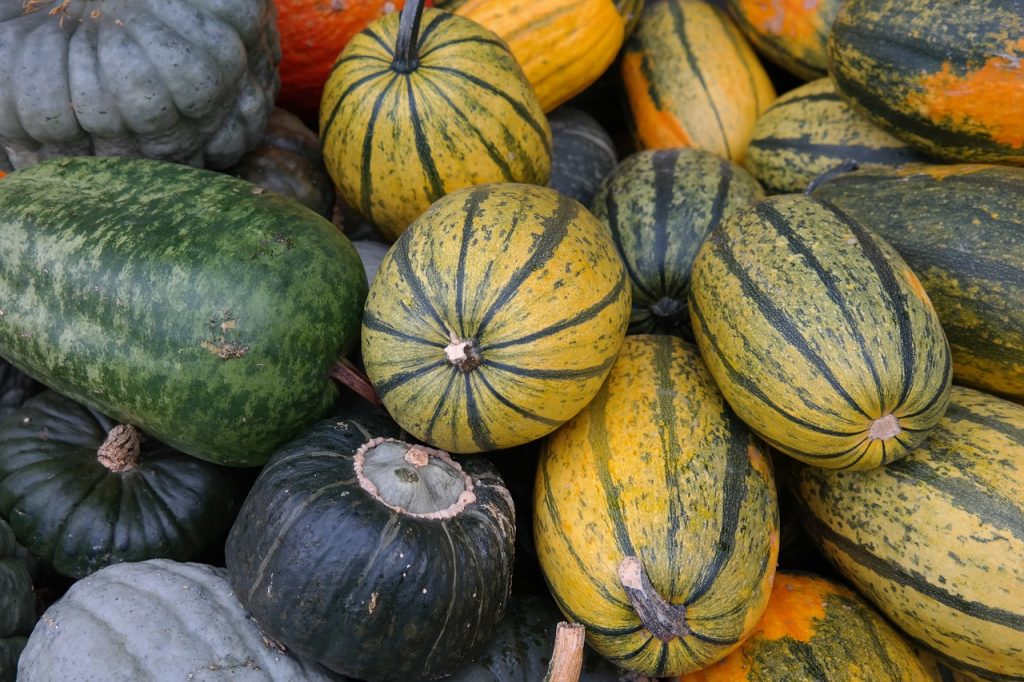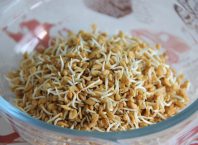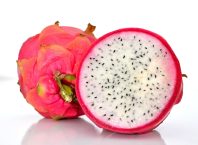Table of Contents
Spaghetti squash is a winter squash that is named for its unique stringy flesh, which resembles spaghetti noodles when cooked. It is a type of vegetable that is often used as a substitute for pasta due to its low-carbohydrate content and high nutritional value. It is a good source of fiber, vitamins, and minerals and is also low in calories, making it a popular choice for people who are looking to maintain a healthy diet. Spaghetti squash can be cooked in a variety of ways, including roasting, boiling, steaming, or microwaving, and can be used in a variety of dishes, such as casseroles, soups, and salads. It is a versatile and healthy ingredient that can help to add flavor and nutrition to your meals.

History of Spaghetti Squash
The history of spaghetti squash can be traced back to Mexico and Central America, where it has been cultivated for thousands of years. It is believed to have been domesticated by indigenous peoples in these regions, who used it as a staple food source.
Spaghetti squash was introduced to the United States in the early 1900s, where it quickly gained popularity as a unique and healthy vegetable. It was originally grown in the southwestern states of Arizona, New Mexico, and California, but is now widely cultivated throughout the country.
Today, spaghetti squash is enjoyed by people all over the world for its delicious flavor, nutritional value, and versatility in cooking. It has become a popular ingredient in many healthy and flavorful dishes, and is often used as a substitute for pasta in low-carbohydrate diets. The history of spaghetti squash is a testament to its enduring popularity and value as a nutritious and delicious vegetable.
What is Spaghetti Squash?
Spaghetti squash is a type of winter squash that is known for its unique stringy flesh, which resembles spaghetti noodles when cooked. It is native to Central America and Mexico and is grown in many other regions today. When cooked, spaghetti squash has a slightly sweet and nutty flavor and can be used as a healthier alternative to pasta. It is a good source of fiber, vitamins, and minerals and is low in calories, making it a popular choice for people looking to maintain a healthy diet. Spaghetti squash can be prepared in a variety of ways, including roasting, boiling, steaming, or microwaving, and can be used in a variety of dishes, such as casseroles, soups, and salads.
Spaghetti Squash Nutrition Values and Facts: Calories, Carbohydrates, Fiber, Protein and Fat
Spaghetti squash is a nutrient-rich vegetable that is low in calories and high in fiber, vitamins, and minerals. Here are some nutrition facts for one cup (155g) of cooked spaghetti squash:
- Calories: 42
- Carbohydrates: 10g
- Fiber: 2.2g
- Protein: 1g
- Fat: 0.4g
- Vitamin C: 5.4mg (9% of daily value)
- Vitamin B6: 0.1mg (6% of daily value)
- Potassium: 181mg (5% of daily value)
- Manganese: 0.1mg (5% of daily value)
- Thiamin: 0.1mg (4% of daily value)
- Niacin: 0.8mg (4% of daily value)
Spaghetti squash is also a good source of other essential vitamins and minerals, including folate, pantothenic acid, calcium, and iron. It is low in carbohydrates and has a glycemic index of 30, which makes it a great choice for those who are watching their blood sugar levels. The high fiber content in spaghetti squash can also help with digestion and promote feelings of fullness, making it a great addition to any healthy diet.
Benefits of Spaghetti Squash
Low in calories
Spaghetti squash is a low-calorie vegetable, which means that it contains relatively few calories per serving. This makes it a great option for those who are trying to lose weight or maintain a healthy weight, as it can help to reduce overall calorie intake without sacrificing taste or nutritional value. One cup of cooked spaghetti squash contains just 42 calories, making it an ideal ingredient for light and healthy meals.
High in fiber
Spaghetti squash is high in dietary fiber, which is an important nutrient that can have a range of health benefits. Fiber helps to promote healthy digestion and can prevent constipation by adding bulk to the stool. It can also help to regulate blood sugar levels and promote feelings of fullness, which can aid in weight management. One cup of cooked spaghetti squash contains around 2.2 grams of dietary fiber, which is approximately 9% of the recommended daily intake for adults.
Rich in vitamins and minerals
Spaghetti squash is rich in essential vitamins and minerals that are important for maintaining good health. One cup of cooked spaghetti squash contains about 9% of the recommended daily intake of vitamin C, which is a powerful antioxidant that can help to protect cells from damage and boost the immune system. It also contains potassium, which is important for maintaining healthy blood pressure levels and supporting heart health, as well as manganese, which is important for bone health and the metabolism of carbohydrates and protein. Other vitamins and minerals found in spaghetti squash include vitamin A, vitamin B6, thiamin, and niacin
Low in carbs
Spaghetti squash is a great option for those who are following a low-carb or ketogenic diet, as it is naturally low in carbohydrates. One cup of cooked spaghetti squash contains only 7 grams of carbohydrates, which is much lower than traditional pasta. This makes it a great substitute for pasta in many dishes, as it can help to reduce overall carbohydrate intake without sacrificing taste or texture. Additionally, the high fiber content in spaghetti squash can help to slow the absorption of carbohydrates, which can help to prevent spikes in blood sugar levels.
Gluten-free
Spaghetti squash is naturally gluten-free, which means that it does not contain the proteins found in wheat, barley, and rye that can trigger an immune response in people with celiac disease or gluten intolerance. This makes it a great option for those who need to follow a gluten-free diet, as it can be used as a substitute for traditional pasta in a wide range of dishes. Additionally, spaghetti squash is a nutrient-dense food that is rich in fiber, vitamins, and minerals, making it a great addition to a healthy and balanced diet for people with or without gluten intolerance.
Versatile
Spaghetti squash is an incredibly versatile ingredient that can be used in a wide range of dishes. It can be roasted, boiled, steamed, or microwaved, and the flesh can be scraped into long, thin strands that resemble spaghetti. These strands can be used as a substitute for traditional pasta in a wide range of dishes, such as spaghetti squash carbonara, spaghetti squash lasagna, and spaghetti squash with meatballs. Additionally, spaghetti squash can be used in salads, soups, and casseroles, or simply seasoned with herbs and spices and eaten on its own. The versatility of spaghetti squash makes it a great option for people who are looking to add more variety and flavor to their meals.
Heart-healthy
Spaghetti squash is a heart-healthy food that can help to reduce the risk of heart disease. This is because it is low in saturated fat, which is a type of fat that can raise cholesterol levels and increase the risk of heart disease. Additionally, the high fiber content in spaghetti squash can help to lower cholesterol levels by binding to bile acids in the intestine and preventing their absorption into the bloodstream. This, in turn, can help to reduce the risk of heart disease and stroke. Incorporating spaghetti squash into a heart-healthy diet can be a delicious way to support cardiovascular health.

Boosts immune system
Spaghetti squash is a great source of vitamin C, which is a powerful antioxidant that can help to boost the immune system. Vitamin C plays a crucial role in the production of white blood cells, which are responsible for fighting off infections and diseases. By incorporating spaghetti squash into your diet, you can help to support your immune system and reduce the risk of infections and illnesses. Additionally, the high fiber content in spaghetti squash can help to promote the growth of healthy gut bacteria, which can also play a role in supporting immune function.
Anti-inflammatory properties
Spaghetti squash contains a variety of nutrients that have been shown to have anti-inflammatory properties. For example, it is a good source of vitamin C, which is a potent antioxidant that can help to reduce inflammation in the body. It also contains beta-carotene, which has been shown to have anti-inflammatory effects. In addition, spaghetti squash is rich in fiber, which can help to reduce inflammation in the gut by promoting the growth of healthy gut bacteria. By incorporating spaghetti squash into your diet, you may be able to reduce inflammation in your body and support overall health and wellness.
Easy to prepare
One of the many benefits of spaghetti squash is that it is incredibly easy to prepare. It can be cooked using a variety of methods, including roasting, boiling, steaming, or microwaving, and can be ready in as little as 30 minutes. To prepare spaghetti squash, simply slice it in half lengthwise, scoop out the seeds and fibers, and place it on a baking sheet. You can then roast it in the oven or microwave it until it is tender. Once it is cooked, you can scrape the flesh with a fork to create long, thin strands that resemble spaghetti. The ease of preparation makes spaghetti squash a great option for busy weeknights or for people who are short on time but still want to enjoy a healthy and delicious meal.
Is Spaghetti Squash Healthy for You?
When spaghetti squash is at its best depends on personal preference and the desired texture. Spaghetti squash is typically harvested in the fall, and its peak season runs from late summer to early winter.
For those who prefer a firmer texture, it’s best to select spaghetti squash when it is still fairly young and small, usually in late summer or early fall. On the other hand, if you prefer a softer texture, it’s best to select spaghetti squash that has had more time to mature, usually in mid to late fall.
When selecting spaghetti squash, look for those that are heavy for their size, with a firm rind that is free from any soft spots or cracks. Once picked, spaghetti squash can be stored in a cool, dry place for several weeks to several months, depending on the maturity at harvest.
Side Effects of spaghetti squash
Allergic reactions
If you have a known allergy to squash, pumpkins, or gourds, you may also be allergic to spaghetti squash. Symptoms of an allergic reaction may include hives, itching, swelling, difficulty breathing, or anaphylaxis, which is a severe and potentially life-threatening reaction.
Digestive issues
Some people may experience digestive issues after consuming spaghetti squash, such as bloating, gas, or diarrhea. This may be due to the high fiber content of the vegetable, which can be difficult to digest for some individuals.
Blood sugar fluctuations
While spaghetti squash is low in carbs and has a low glycemic index, it still contains some natural sugars that can cause blood sugar fluctuations in people with diabetes or other blood sugar-related conditions. If you have a history of blood sugar issues, it is recommended to consult with your doctor before adding spaghetti squash to your diet.
Interference with medications
Spaghetti squash contains vitamin K, which can interfere with blood-thinning medications such as Warfarin. If you are taking any medications, it is recommended to speak with your doctor before consuming large amounts of spaghetti squash or any other foods high in vitamin K.
Rich in Tocopherol
Tocopherol, also known as vitamin E, is a fat-soluble vitamin that acts as an antioxidant in the body. Spaghetti squash is a good source of tocopherol, with one cup (155 grams) of cooked spaghetti squash providing approximately 0.7 milligrams of vitamin E, which is about 5% of the daily recommended intake.
Tocopherol plays an important role in protecting cells from damage caused by free radicals, which are unstable molecules that can contribute to chronic diseases such as cancer, heart disease, and Alzheimer’s disease. Vitamin E also supports immune function and helps to maintain healthy skin and eyes.
While spaghetti squash is not the most significant source of vitamin E compared to other foods such as nuts, seeds, and vegetable oils, it is still a nutritious addition to a healthy and balanced diet. Incorporating a variety of vitamin E-rich foods, including spaghetti squash, can help to support overall health and prevent chronic disease.
How to Prepare Spaghetti Squash?
Spaghetti squash can be cooked using a variety of methods, including roasting, boiling, steaming, or microwaving. Here is a step-by-step guide on how to cook spaghetti squash using the roasting method:
- Preheat your oven to 375°F (190°C).
- Cut the spaghetti squash in half lengthwise using a sharp knife.
- Scoop out the seeds and fibers using a spoon.
- Place the spaghetti squash halves cut side down on a baking sheet.
- Bake in the oven for 35-45 minutes, or until the flesh is tender when pierced with a fork.
- Remove the spaghetti squash from the oven and let it cool for a few minutes.
- Use a fork to scrape the flesh of the squash lengthwise to create long, thin strands that resemble spaghetti noodles.
- Serve the spaghetti squash as desired.
FAQs
Is spaghetti squash a type of pasta?
No, spaghetti squash is a vegetable that is named for its stringy, pasta-like texture when cooked.
How do you know when spaghetti squash is ripe?
Ripe spaghetti squash will have firm, smooth skin that is a pale yellow color. It should feel heavy for its size and have a dry stem.
Can you eat spaghetti squash raw?
Technically, yes, you can eat spaghetti squash raw, but it is not recommended as it can be difficult to digest and may not taste very good.
Can you freeze cooked spaghetti squash?
Yes, you can freeze cooked spaghetti squash. Simply let it cool to room temperature, then pack it into a freezer-safe container or bag.
How long does cooked last in the fridge?
Cooked spaghetti squash can be stored in an airtight container in the fridge for up to 5 days.
Can spaghetti squash be cooked in the microwave?
Yes, spaghetti squash can be cooked in the microwave. Pierce it several times with a fork, then microwave on high for 8-12 minutes, depending on the size of the squash.
Is spaghetti squash gluten-free?
Yes, spaghetti squash is gluten-free and can be a great alternative to pasta for those with celiac disease or gluten sensitivity.
How do you use spaghetti squash in recipes?
Spaghetti squash can be used in place of pasta in many recipes, or as a base for salads, stir-fries, and casseroles. It can also be seasoned with herbs and spices and served as a simple side dish.
Is spaghetti squash healthy?
Yes, spaghetti squash is a healthy choice as it is low in calories, high in fiber, and packed with vitamins and minerals.
Conclusion
spaghetti squash is a versatile and nutritious vegetable that can be a great addition to any diet. It is low in calories and carbs, high in fiber and rich in vitamins and minerals. It is also gluten-free and heart-healthy and has been shown to have anti-inflammatory properties and boost the immune system. With its stringy, pasta-like texture when cooked, spaghetti squash can be used in a variety of recipes or served as a simple side dish. Whether you are looking to eat healthier, try something new, or simply enjoy a delicious and satisfying meal, spaghetti squash is definitely worth adding to your menu.















